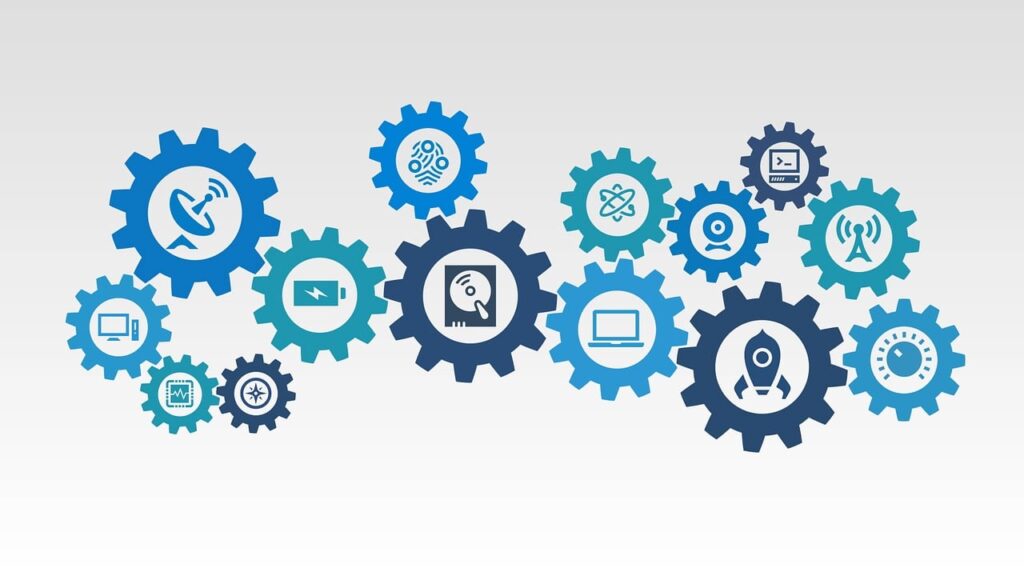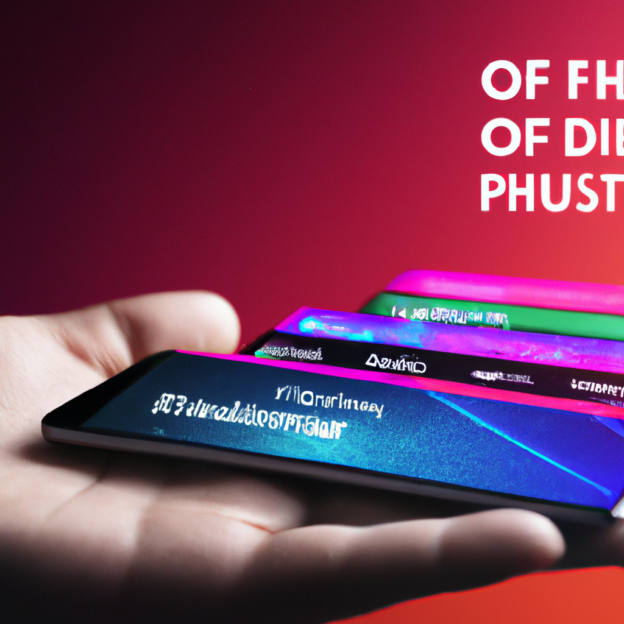In this fast-paced era of technological advancements, the question on everyone’s mind is how digitalization can revolutionize the way we work in the future. As we witness the rise of automation, artificial intelligence, and the Internet of Things, it becomes imperative to understand the potential benefits that digitalization can bring to the workplace. From streamlining processes and increasing productivity to enhancing communication and enabling remote work, the possibilities seem endless. Join us on a thought-provoking journey as we explore the various ways digitalization can transform the future of work.

This image is property of pixabay.com.
Enhanced productivity
Digitalization can greatly enhance productivity in the workplace by automating repetitive tasks, enabling employees to focus on more value-added activities. With the help of technology, tasks that require manual effort and consume a significant amount of time can now be easily automated. For instance, data entry, report generation, and inventory management can all be streamlined through digital tools and software.
Additionally, digitalization promotes increased collaboration and communication among team members. With the advent of digital platforms and tools, coworkers can easily connect and share information, regardless of their physical location. This improves overall efficiency and ensures that everyone is on the same page in terms of project progress and updates. It also eliminates the need for constant back-and-forth emails and the delays associated with them.
Efficient data management is another aspect where digitalization proves to be valuable. Digitizing data not only reduces the risk of information being lost or damaged, but it also makes it easier to access and analyze. By implementing effective data management systems, organizations can quickly retrieve relevant information, make data-driven decisions, and ensure compliance with data protection regulations.
Remote work opportunities
The digitalization of work has opened up countless remote work opportunities. As more employers realize the benefits of flexible work arrangements, employees can now enjoy the freedom to work from anywhere with an internet connection. This brings in a multitude of advantages for both individuals and organizations alike.
One of the main advantages of remote work is the flexibility it offers. Employees can set their own schedules, allocating specific hours for work that align with their personal preferences and commitments. This flexibility leads to increased job satisfaction, as individuals can strike a balance between work and personal life more effectively.
Moreover, digitalization allows organizations to tap into a global talent pool. No longer constrained by geographical boundaries, companies can hire individuals with specialized skills and expertise from different parts of the world. This diversity of talent enables teams to bring fresh perspectives, innovative ideas, and unique approaches to problem-solving.
Another significant benefit of remote work is the reduction in office expenses. With fewer employees physically present in the workplace, companies can downsize their office spaces, leading to significant cost savings. Additionally, expenses related to transportation, utilities, and office equipment can be minimized, contributing to overall financial efficiency.

This image is property of pixabay.com.
Streamlined processes
Digitalization facilitates streamlined processes, enabling organizations to manage workflows more effectively. By implementing digital project management tools, teams can collaborate efficiently, assign tasks, track progress, and set deadlines. This ensures that projects are completed on time and within budget, reducing delays and enhancing overall productivity.
Furthermore, digitalization promotes faster decision-making. Real-time data and insights are readily available, allowing leaders to make informed decisions quickly. Gone are the days of relying on gut feelings and intuition; digital tools provide accurate and up-to-date information, enabling leaders to navigate challenges and seize opportunities swiftly.
Effective project management is another area that benefits from digitalization. By utilizing digital platforms, teams can organize and coordinate complex projects more effectively. With features like task lists, Gantt charts, and shared calendars, project managers can assign responsibilities, track progress, and ensure that all team members are aligned towards the common goal.
Enhanced employee engagement
Digitalization enhances employee engagement by offering personalized learning and development opportunities. Online training courses, webinars, and e-learning platforms make it easier for employees to access relevant resources and upskill themselves. This not only benefits individual career growth but also contributes to overall organizational development.
Moreover, gamification of tasks can significantly boost employee engagement. By incorporating game elements such as challenges, competitions, and rewards into work processes, organizations can create a sense of excitement and motivation among employees. This gamified approach encourages higher levels of participation, creativity, and productivity.
Real-time feedback and recognition are also made possible through digitalization. Digital tools allow for immediate feedback, enabling managers to provide constructive criticism, identify areas for improvement, and acknowledge outstanding performance. This continuous feedback loop fosters a culture of growth and development, increasing employee satisfaction and motivation.

This image is property of pixabay.com.
Improved work-life balance
Digitalization plays a crucial role in improving work-life balance for individuals. Flexible scheduling is one of the key benefits, as it allows employees to better manage their time and commitments. With the ability to work remotely, individuals can choose when and where they work, ensuring that they can balance their personal and professional lives effectively.
Additionally, digitalization reduces commuting time. With remote work options and digital communication tools, employees no longer need to spend hours commuting to and from the office. This not only saves time but also reduces stress levels, leading to improved well-being and overall happiness.
Furthermore, the enhanced work-life balance resulting from digitalization positively impacts individuals’ mental and physical health. The ability to spend more time with family and engage in recreational activities promotes better overall well-being, which in turn leads to increased productivity and job satisfaction.
Enhanced data analytics
Digitalization enables organizations to harness the power of data analytics, leading to actionable insights for strategic decision-making. By collecting and analyzing large volumes of data, organizations can gain valuable insights into their customers, operations, and market trends.
These actionable insights allow leaders to make informed decisions that drive business growth and efficiency. With a deeper understanding of customer preferences and behaviors, organizations can personalize their communication and services, providing a more tailored and satisfying experience.
Additionally, digitalization enables predictive analytics, which can greatly aid in improved planning. By analyzing historical data and patterns, organizations can forecast future trends and anticipate potential challenges. This allows for proactive measures to be taken, reducing risks and optimizing operations.
Furthermore, digital tools make it easier for organizations to identify trends and patterns in data. By analyzing large datasets, companies can gain insights into consumer behavior, market trends, and emerging opportunities. This knowledge equips organizations with the necessary information to adapt to changing market conditions and stay ahead of the competition.

Improved customer experience
Digitalization greatly enhances the customer experience by enabling personalized communication and services. With the help of digital platforms, companies can effectively engage with customers on an individual level, tailoring their offerings to meet specific needs and preferences.
Furthermore, digitalization facilitates efficient complaint resolution. With online communication channels, customers can easily reach out to companies to voice their concerns or seek assistance. This enables organizations to address issues promptly and effectively, enhancing customer satisfaction and loyalty.
Additionally, digitalization ensures 24/7 accessibility for customers. Online platforms, chatbots, and self-service portals enable customers to access information, make inquiries, or complete transactions at any time, from anywhere. This convenience and availability contribute to a positive customer experience and can significantly improve customer retention rates.
Reduced environmental impact
Digitalization plays a vital role in reducing the environmental impact of businesses. With the decrease in paper usage, organizations can significantly contribute to saving trees and conserving the environment. Digital documents, online collaboration tools, and electronic signatures eliminate the need for paper-based processes, resulting in reduced waste and a more sustainable approach.
Moreover, digitalization helps lower carbon footprints. By reducing the need for physical commuting, remote work options minimize carbon emissions associated with transportation. Additionally, digital communication tools replace the need for face-to-face meetings, further reducing travel-related carbon footprints.
Furthermore, the adoption of energy-efficient solutions contributes to a reduced environmental impact. With the right implementation of technology, organizations can optimize energy consumption, leading to lower electricity usage and reduced greenhouse gas emissions.

Increased innovation
Digitalization fosters increased innovation by facilitating collaboration across diverse teams. With the ability to connect and communicate globally, organizations can bring together individuals with different backgrounds, expertise, and perspectives. This collaboration enables the cross-pollination of ideas, leading to innovative solutions and approaches to problems.
Moreover, digitalization enables rapid prototyping and iteration. With the availability of digital tools and software, organizations can quickly develop and test new ideas, products, or services. This accelerated innovation cycle allows for faster learning, adaptation, and improvement, leading to increased competitiveness and growth.
Additionally, digitalization provides access to emerging technologies. By incorporating technologies such as artificial intelligence, machine learning, and blockchain, organizations can stay at the forefront of innovation. These technologies unlock new possibilities and enable the development of groundbreaking solutions that can revolutionize industries.
Enhanced cybersecurity
Digitalization requires a strong focus on cybersecurity to protect sensitive data and ensure secure operations. Advanced threat detection and prevention measures are essential to safeguarding organizational systems and preventing unauthorized access or data breaches. By implementing robust security protocols and continuously monitoring for potential threats, organizations can mitigate risks and maintain the integrity of their digital infrastructure.
Secure data storage and transmission are crucial considerations in the digital age. With the increasing volume of data being generated and transferred, organizations must prioritize data security at every stage. Encryption, secure authentication methods, and regular backups are essential to protect sensitive information and ensure its confidentiality.
Furthermore, adherence to data privacy regulations is essential in today’s digital landscape. Organizations must comply with data protection laws and regulations to ensure that customer data is handled appropriately and ethically. By maintaining compliance, organizations build trust with customers and stakeholders, enhancing their reputation and credibility in the market.
In conclusion, digitalization offers numerous benefits for work in the future. From enhanced productivity and remote work opportunities to streamlined processes and improved work-life balance, the potential of digitalization is vast. The ability to harness data for actionable insights, delivering personalized customer experiences, reducing environmental impact, fostering innovation, and ensuring cybersecurity are all areas where digitalization can transform the way we work. By embracing digital tools and technologies, organizations can unlock new levels of efficiency, effectiveness, and competitiveness in the ever-evolving digital landscape.









